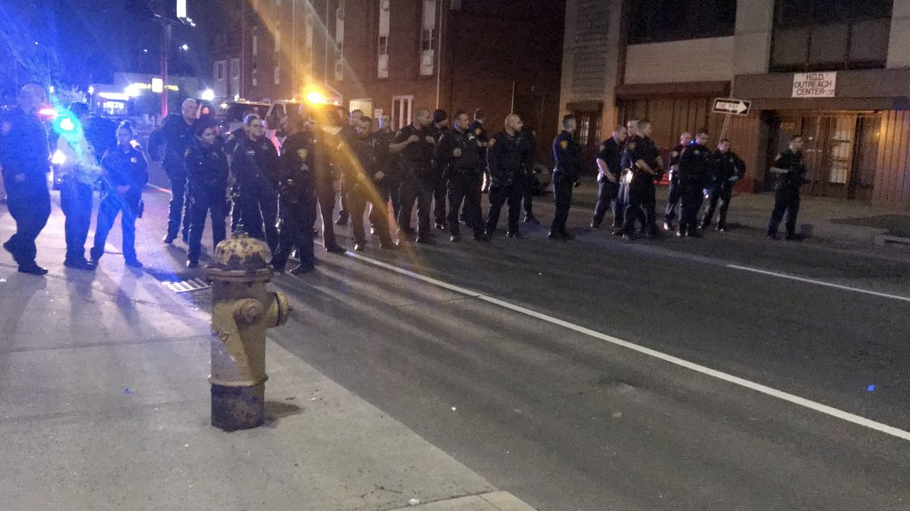Incident details
- Date of incident
- May 9, 2019
- Location
- Bridgeport, Connecticut
- Arrest status
- Detained and released without being processed
- Arresting authority
- Bridgeport Police Department
- Unnecessary use of force?
- No
Arrest/Criminal Charge

Bridgeport, Connecticut, police line up in response to a protest around the second anniversary of the shooting death of Jayson Negron. Reporter Tara O’Neill was detained and 11 others were arrested during the protest.
Connecticut police chief issues written apology for arrest of Hearst reporter
A Connecticut police chief whose officers arrested a reporter in May has issued a formal written apology and explanation, according to the Connecticut Post.
Hearst Connecticut Media reporter Tara O’Neill was arrested and detained on May 9, 2019, in Bridgeport while covering the protest of a police shooting, despite identifying herself as a reporter and wearing credentials.
In an undated letter released Oct. 22, 2019, Police Chief Armando Perez wrote Hearst Connecticut’s Vice President of News and Digital Content, Matt DeRienzo, that the department appreciates the press and believes in First Amendment rights.
“Those rights are sacred and fundamental to our society and we need to make sure we respect them by our actions,” the letter said. It also stated: “In the confusion of clearing the areas—regretfully—an officer did not realize that Ms. O’Neill was identifying herself as a reporter and was wearing identification.”
Body camera footage of the arrest was also released this week, and O’Neill posted stills and responded to it in a Twitter thread.
“Shoutout to my credentials for being clearly on display as I’m escorted through booking in handcuffs,” she posted.
Police Chief Perez expressed regret for O’Neill’s detainment and apologized for it, calling it a “mistake made during a commotion at a highly volatile time.”
In a statement, Hearst’s DeRienzo reacted to the letter with suspicion of its motives, according to the Post.
“It comes after months of delay, and only after a contentious election in which police misconduct was a significant issue,” DeRienzo said.
On Twitter, DeRienzo posted about the letter, saying the arrest was “a thinly veiled intimidation and retaliation” for O’Neill’s reporting.
The New England First Amendment Coalition, which had also objected to the arrest with a letter to the police chief, told the Post that the coalition had yet to receive a response, and questioned what changes would be made to prevent the First Amendment violation from happening again.
Hearst Connecticut Media reporter Tara O’Neill was arrested while covering a demonstration in Bridgeport and briefly held in police custody on May 9, 2019.
According to her first-person account for the Connecticut Post, O’Neill was handcuffed by Bridgeport police while she was reporting on a protest commemorating the two-year anniversary of the fatal police shooting of teenager Jayson Negron. O’Neill was held for about 30 minutes, and then released without charges.
O’Neill shared video footage of her arrest on Twitter.
Footage of me getting arrested in #Bridgeport while covering a #JusticeforJayson protest on the two-year anniversary of his death. pic.twitter.com/4zEFIHSKj9
— Tara O'Neill (@Tara_ONeill_) May 10, 2019
“I was standing on the sidewalk when they were asking people to get off the street and as I was being handcuffed I said, ‘I’m on a public sidewalk. I’m the press,’” O’Neill told the U.S. Press Freedom Tracker in an email. “All I heard the arresting officer respond was ‘Ok,’ before he told me to sit down on the ground and not move.”
She said she was wearing her press badge on a lanyard around her neck, and that after being handcuffed, she attempted to explain to the officers that she was a reporter.
“It didn’t seem to make any difference to them at that point,” she said.
O’Neill was put in the back of a police car and taken to the police station, but never placed in a holding cell. The arresting officer, according to O’Neill, later apologized and said he did not know she was a reporter.
The New England First Amendment Coalition quickly condemned her arrest and detention. The Coalition called on Bridgeport police to issue a formal apology, release the name of the arresting officer, and review the department’s internal policies to prevent the future infringement on journalistic rights.
“Looking back at what happened, I’m frustrated to know that there might not have been anything I could have done to prevent it — other than not showing up and doing my job,” O’Neill wrote in the Connecticut Post.
The U.S. Press Freedom Tracker catalogues press freedom violations in the United States. Email tips to [email protected].